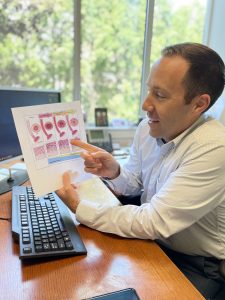
What is food impaction?
A food impaction is when a bolus, or rounded mass of chewed food, gets lodged in the esophagus and cannot be swallowed or regurgitated. Most food bolus impactions resolve without intervention. When symptoms persist, patients will often seek medical attention.
Symptoms:
- Difficulty swallowing, also known as dysphasia
- Chest discomfort
- Inability to handle saliva/secretions
- Sensation of something stuck in esophagus
- Food or liquid intake may induce vomiting
Why did I get a food impaction?
When talking about a food impaction, there are a myriad of potential reasons this can occur. While it can be due to inappropriate chewing, it’s possible there is a bigger culprit at play. One such possibility is a disease called eosinophilic esophagitis (EoE). This immune disorder is an allergic reaction that happens in the esophagus. Individuals suffering from EoE may experience symptoms for many months without consulting a doctor, until the impaction requires emergency attention.
Some of the other reasons for a food impaction include motility disorders (achalasia) or structural problems within the esophagus, like a Schatzki ring or peptic stricture.
Treating Food Impaction:
Excessive drooling and chest discomfort will alert you that it is time to visit the Emergency Department. Initial attempts will often be made to medically help the esophagus relax in an effort to pass the bolus naturally. If this is unsuccessful you will likely require an endoscopic procedure to remove the food bolus. You’ll be appropriately sedated for the procedure and the impaction will either be pushed into your stomach or, if necessary, pulled out with the aid of nets and pincers.
Once the bolus is removed, the doctor can often identify the cause and create a more extensive treatment plan to prevent additional impactions.
Treating EoE:
If you experience the symptoms above, consult your primary care provider before symptoms worsen. They can place a referral to a GI doctor to explore these issues. If detected early and started on treatment, you can often save yourself from a future trip to the Emergency Department to remove a food impaction.
If diagnosed with EoE, treatment options include:
- PPIs, also known as proton pump inhibitors, like Prilosec and Nexium, can reduce stomach acid. Unchecked acid reflex can impact the esophagus and contribute to food impaction.
- Steroids, like Budesonide, decrease immune response to allergens.
- Food elimination diet requires time and patience, but aims to identify the culprit food(s) causing the allergic reaction. The foods that most commonly cause EoE are dairy, wheat, eggs, soy, nuts, and seafood.
